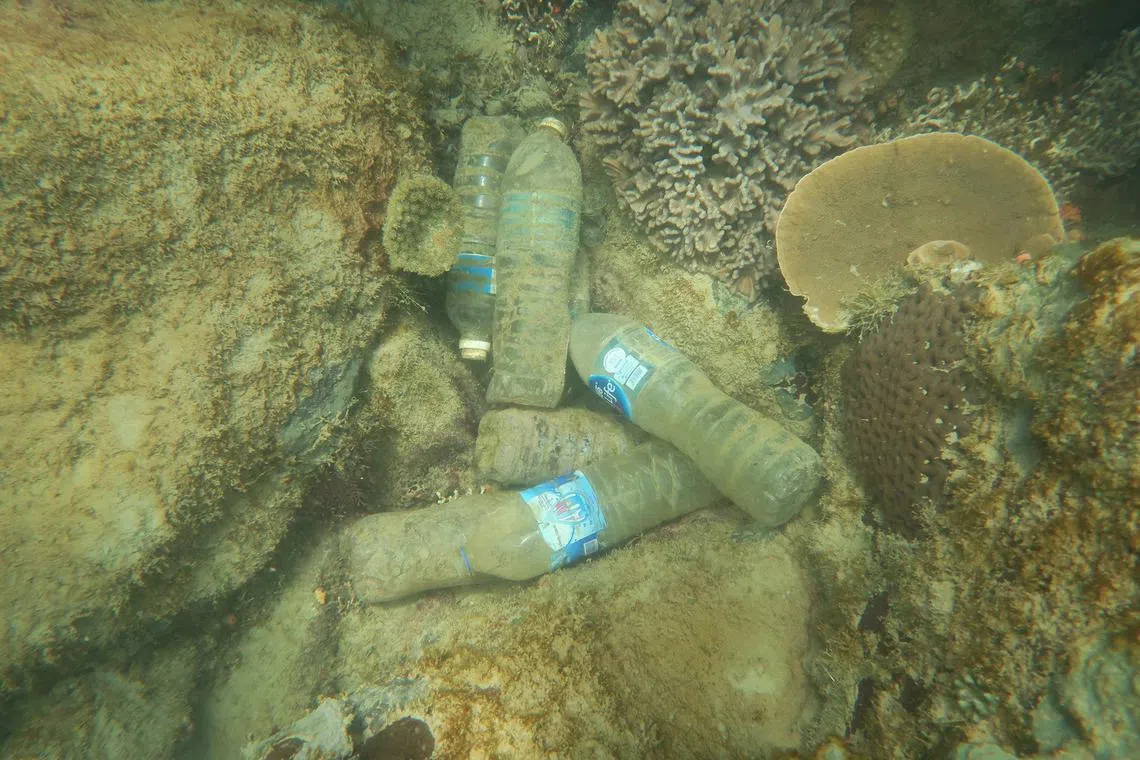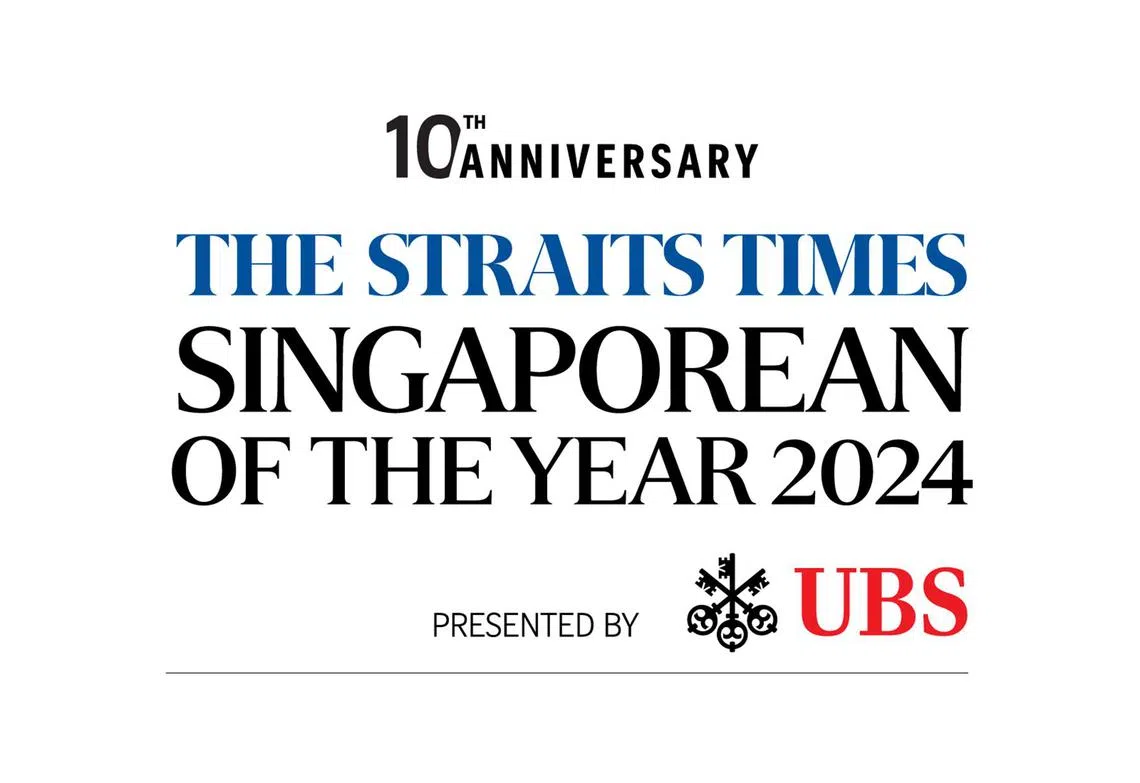Singaporean of the Year finalist: Marine biologist dives into work to rally people to save seas
Sign up now: Get ST's newsletters delivered to your inbox
Sam Shu Qin, a champion of marine conservation, spends most weekends either planting corals or leading a team of volunteer divers to collect trash from underwater. She is a finalist for The Straits Times Singaporean of the Year 2024 award.
Follow topic:
SINGAPORE – Marine biologist Sam Shu Qin knows as well as anyone that the seas and oceans are full of mysteries.
But a washing machine was the last thing she expected – and hoped – to find at the bottom of the sea while on a dive to check on the health of coral reefs in Singapore’s waters in 2017.
The sight jolted Ms Sam, who also made such dives to plant corals and collect marine litter with her then colleagues at the NUS Tropical Marine Science Institute (TMSI), into action.
Said the 35-year-old: “The washing machine was squashing a patch of corals and destroying them. I felt so disturbed and told one of my colleagues that we must do something about this, because we can do all this coral restoration work, but the illegal dumping will continue.”
A few months after the incident, she co-founded Our Singapore Reefs, a community initiative that cleans up coral reefs and raises awareness about the country’s marine biodiversity.
Since 2017, the group has cleared about 12,000 pieces of rubbish weighing over 3,000kg during 81 dive clean-ups involving more than 1,000 volunteer divers.
It also holds monthly beach clean-ups and talks, workshops and film screenings on marine conservation – the protection and preservation of marine habitats including coral reefs, mangroves and seagrass meadows.
Ms Sam is a finalist for the Singaporean of the Year award, organised by The Straits Times. It is given to a Singaporean, or a group of citizens, who has made a significant contribution to society.
This can be through achievements that put the Republic on the world stage, or by going beyond the call of duty to selflessly improve the lives of others in the community, among other ways.
The award, now in its 10th year, is presented by UBS Singapore.
Our Singapore Reefs, which has about 50 volunteer divers, conducts six to eight dive clean-ups every year.
The most common items the divers find and remove are plastic bottles, food packaging and fishing lines, said Ms Sam, an instructor at NUS College. She takes students to the islands of Bali and Lombok in Indonesia to work with coastal communities to protect their marine ecosystems.

A volunteer diver passing a bag of marine debris to marine biologist Sam Shu Qin during a clean-up around Lazarus Island on Nov 23.
ST PHOTO: KEVIN LIM
Ms Sam said such litter harms marine animals and destroys coral reefs by causing abrasions or breaking the corals. Litter like cloth and plastic sheets can block sunlight needed by microscopic algae called zooxanthellae that live in the corals’ tissues and provide them with nutrition.
“Coral reefs are the foundational building blocks of the entire marine ecosystem. They take up less than 1 per cent of the ocean floor, but are home to 25 per cent of marine species. Without them, a lot of marine life cannot survive,” she noted.
She said about 60 per cent of Singapore’s reef area has been lost to land reclamation. Most of the nation’s remaining healthy reefs are found in the Southern Islands, such as Kusu and Lazarus.
During more than eight years as a research associate at TMSI, Ms Sam restored coral reefs in Singapore’s waters by transplanting coral fragments onto degraded reefs and artificial reef structures.
But her love of marine life began long before that. As a child, she was fascinated by the fish at her uncle’s kelong – a traditional offshore wooden platform built on stilts – that her family would visit every Chinese New Year.
Her parents, who are hawkers, often took her and her two younger sisters to the Underwater World Singapore aquarium when they were primary school pupils.
While waiting to enter university to study biological sciences many years later, she returned to work there as a guest service officer who shared her knowledge about marine animals with visitors.

Marine biologist Sam Shu Qin holding a coral caught in fishing lines that were picked up by diver volunteers during a clean-up around Lazarus Island on Nov 23.
ST PHOTO: KEVIN LIM
Now, Ms Sam wants to make learning about marine biodiversity even more accessible.
In March, she started a non-profit group called Our Blue Spaces, which will run “coral and cocktail” talks – using drinks to demonstrate phenomena such as coral bleaching – and other creative activities like escape room games.
“I want to make science fun and bring a part of the sea to people. Even though Singapore is an island nation, many people say they feel very little connection to the sea and don’t know why it’s important to us,” said Ms Sam, who also has a master’s degree in science communication.
Our Blue Spaces, which she set up with NUS lecturer Toh Tai Chong and business development manager Yvonne Chang, will also embark on regional projects.
For starters, Ms Sam plans to expand an existing initiative she is involved in with the Les Village fishing community on the northern coast of Bali to restore corals there, teach locals how to monitor and maintain coral transplants, and improve their livelihoods through ecotourism.
The non-profit group also intends to partner coastal fishing communities in Timor-Leste for marine conservation efforts.

Plastic bottles are among the most common types of trash retrieved during clean-ups in Singapore’s waters, said Ms Sam Shu Qin, co-founder of Our Singapore Reefs.
PHOTO: COURTESY OF SAM SHU QIN
NUS marine biologist Huang Danwei, deputy head of the university’s Lee Kong Chian Natural History Museum, said such regional work is not just important for local communities, but also vital to Singapore because the country’s marine ecosystems are intertwined with those in the region.
He added: “In Singapore, we are surrounded by the sea; none of us is more than 15km away from it. Our lives and activities are tied to the sea, whether it’s the shipping industry, recreation or the food we eat.
“When you remove rubbish from the sea, like Our Singapore Reefs does, you are not just protecting coral reefs and marine life... but also preventing things like fishing lines and nets from breaking away and flowing to some other habitats and destroying them.”
For Ms Sam, a self-professed “daredevil”, there is still more to be done to protect marine life.
“My hope for the future is for humans and nature to coexist, and in these places, nature can thrive and people can continue to really enjoy what they love in the natural environment.”

SOTY24 - Composite Logo Credit: ST
The Straits Times
The Straits Times Singaporean of the Year (SOTY) is an award that is given to a Singaporean or group of citizens who have made a significant contribution to society. This can be through achievements that put Singapore on the world stage, or by going beyond the call of duty to selflessly improve the lives of others in the community, among other ways.
Organised by The Straits Times and presented by UBS Singapore, the annual award is now in its 10th year. The official airline partner is Singapore Airlines and the global hotel partner is Millennium Hotels and Resorts.
How to nominate:
- Go to str.sg/soty24nominate
- Submit your nomination by Dec 31, 2024
- For more info on SOTY, go to
Prizes for award recipient and finalists
Award recipient receives:
- $20,000 cash
- One pair of Singapore Airlines business class tickets for each individual/group, up to three pairs of tickets for the winning group
- A five-night stay in any of Millennium Hotels and Resorts’ properties globally, up to a maximum of three sets of accommodation for the winning group
Finalist receives:
- $5,000 cash for each individual/group
- One pair of Singapore Airlines economy class tickets for each individual/group, up to a maximum of three pairs for each group of finalists
- A three-night stay in one of Millennium Hotels and Resorts’ properties globally, up to a maximum of three sets of accommodation for each finalist.

